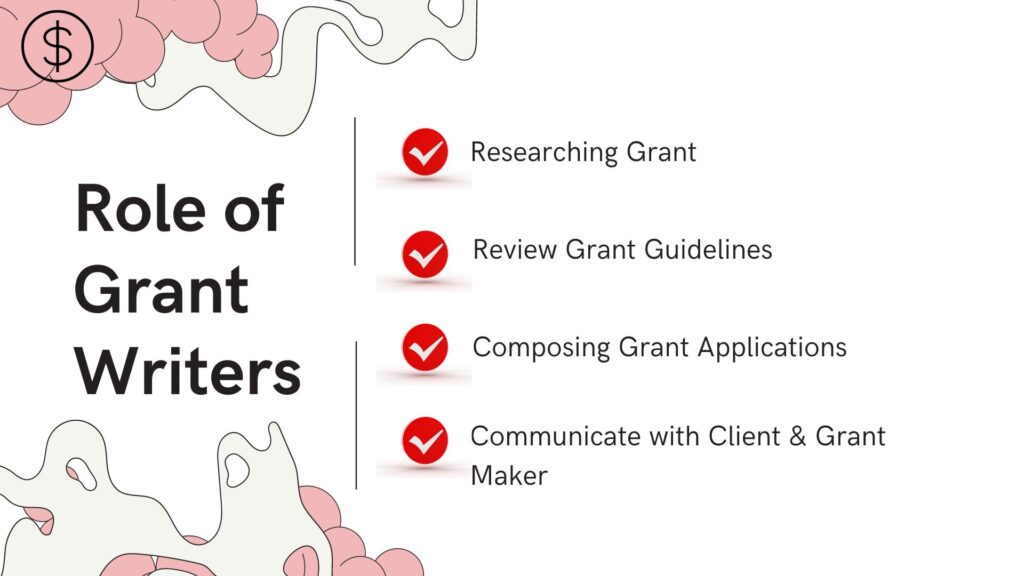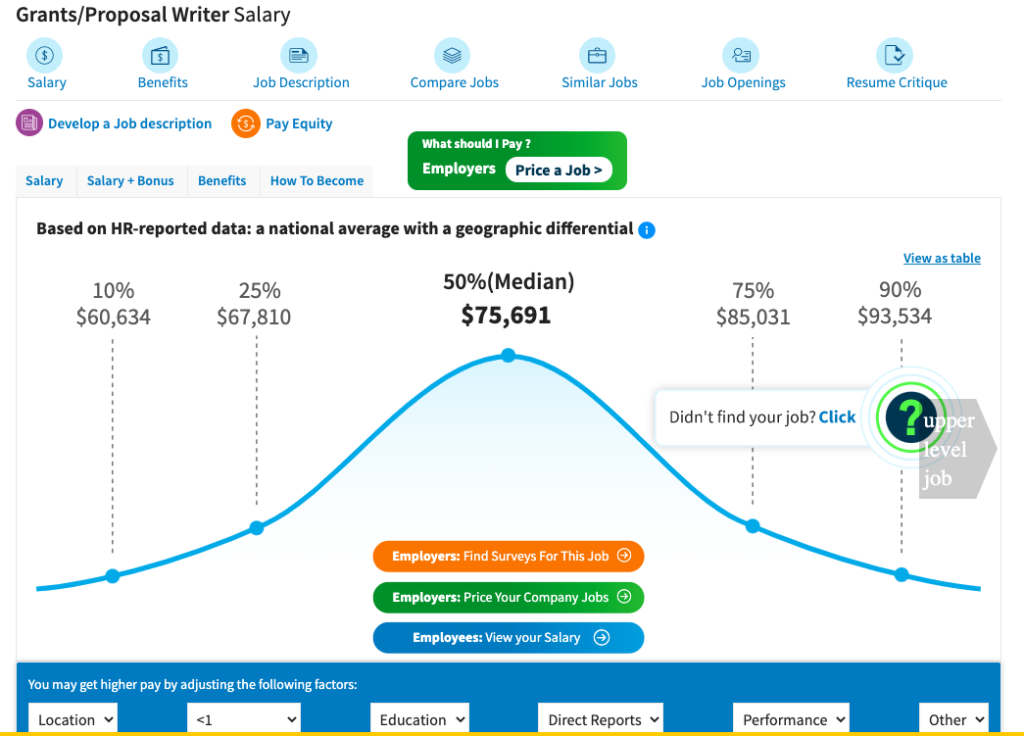Grant writing can be a rewarding career. In this guide, you’ll learn read grant writer job description and learn how to become a grant writer without experience.
If you are looking for a side hustle as a freelancer, grant writing is one of the options that would suit your interest. Even if you are an amateur writer with little to no experience, you can pursue grant writing as a full-time profession.
Want to know how to become a grant writer? Read on:
What is a Grant Writer?
Grant writers help nonprofit organizations obtain funding by crafting proposals. Grant writers contact corporations, businesses, or government agencies (grantmakers or sponsors) that offer grants.
| Entry-Level Education | Undergraduate Degree |
| Entry Level Pay (December 2022) | $60,634 |
| Degree Field | English Journalism Marketing |
| Grant Writing Remote Jobs | Available on Upwork, Freelancer.com |
| Similar Occupations | Communications Fundraising Budgeting |
What Does a Grant Writer Do?
Before you learn how to become a grant wrier, it’s important to understand what grant writers do.
In addition to writing proposals, grant writers research sponsors (grant-making agencies and foundations) to find ones that have funded similar projects to those of the nonprofit. A good grant writer understands the conditions of the grant, they research the proposed project down to the last detail, and show how the nonprofit meets those conditions.
The accomplishment of a nonprofit depends heavily on the expertise of these specialists. You will compose an application or grant submission as a grant writer for the funding institutions. As a professional grant writer, you’ll be accountable for a variety of tasks, such as:

I. Researching Grant: A grant writer must take the time to figure out which grants are worth applying for, as pursuing grants costs time, resources, and money.
II. Understand Grant Timeline and Conditions: Many grants have specific qualifications rules and grant writers need to know these requirements before drafting proposals.
III. Composing Grant Applications: Writers of grant proposals must be creative in explaining why a company’s compelling causes, such as the environment or education, deserve funding. To be considered for the grant, the proposal should be accurate and informative, but it also needs to stand out and be persuasive.
IV. Communicate with Sponsor and Client: Grant writers should answer potential sponsor’s questions and maintain regular communication with them.
In a nutshell, that is the grant writer’s job description. So now let’s dive in to check out the industries where you can genuinely seek fulfilling employment.
Here’s a step-by-step guide on how to become a grant writer:
How to Become a Grant Writer?

How to Become a Grant Writer Without Experience
1. Educate Yourself
For a career in grant writing, you can also take journalism, marketing, public relations, creative writing and other English-related courses. Employers usually require applicants for grant writing positions to have a bachelor’s degree.
To write grants successfully, you will need to acquire the excellent skill set that you will need when you obtain a bachelor’s degree. It is not necessary to major in English or writing to become a grant writer, but it may be helpful to choose a major that involves persuasive tactics.
II. Develop Your Skills
After completing your bachelor’s degree, refine your grant writing skills. Enrol in an online grant writing certificate program. Earning a certificate will further help your resume stand out to employers. Taking an online grant writing class is another option. You can find a wide range of free grant proposal resources online as well.
III. Volunteer at Local Nonprofits
Want to know how to become a grant writer with no experience? start volunteering at local nonprofits. You might not make money in the beginning, but as you keep writing and learning, more opportunities will come.
A high school student can volunteer part-time and progress to a full-time role; even a junior-level member could be a volunteer. Volunteering for these local nonprofits will add to your resume. It will be much easier to land a grant writing job if you have relevant, meaningful experience on your CV.
IV. Start Networking
Volunteering at a nonprofit organization can give you valuable experience-and introduce you to successful grant writers. A professional grant writer takes advantage of that.
You can also make connections with industry professionals outside of events. It’s an easy way to keep in touch and learn more about the industry. You can ask them to write letters of recommendation for you or to refer you to employers.
V. Join an Association
Joining a professional group for grant writers will provide you with more job opportunities and training. Membership in a grant writers association also gives you the opportunity to attend conferences and network with other grant writers.
How to Write a Grant:
Now that you know how to become a grant writer, it’s time to learn how to write a grant successfully. Grant writing may require a little more expertise and commitment to get started. Still, the compensation and benefits from assisting businesses and potential clients in obtaining critically important grants far surpass the initial work. Follow these tips to become a successful grant writer:
1. Know Your Data
When trying to qualify for a grant, a grant writer must understand what data they are including in their proposal. In addition, you should be aware that hundreds or thousands of other charitable organizations or businesses may be vying for the same grant. To produce a successful grant request, do a fact check on:
- The ventures that would get funding if the grant were authorized
- The population or demographic that is impacted
- The problem(s) that the grant would attempt to solve
- The proposal needs to cover every aspect of the application and be well-developed.
- How will the project be run and completed?
- The budgetary plan and intended use of the funds
2. Clearly Describe Purpose
What is the purpose of applying for a particular grant? You cannot justify the need for funding by saying “we need funding.” Hence, make sure you clearly explain how your project will contribute to the community and how it will make a significant impact.
3. Differentiate yourself
Set yourself apart by explaining how your organization’s work is different. Most first-time grant proposals are rejected because a nonprofit is unlikely to receive a grant without an existing relationship with the foundation. If you can set your organization apart from the masses, you increase your chances of getting a “yes”.
4. Be Concise
The most effective grant proposals are easy to read and understand. If you wish to appeal to the majority of foundations and corporations, you should eliminate all jargon. Your story should be told from the heart, in words that everyone can understand.
5. Be a Good Storyteller
Let’s say you spend hours every day reading grants. Eventually, they’ll all sound the same—unless one touches you. Why should a reader fall in love with your organization? It’s all about the story. If you can perfect the art of storytelling, your grant proposals will stand out.
6. Make Your Proposal Solution-Centric
Avoid talking too much about problems (instead of solutions). Remember: Your proposal is going to be read by a real person, so you want to convey positive emotions. More than why, grant makers want to know how you’re going to accomplish your goals.
By now, you know how to become a grant writer without experience and how to write a grant successfully. Let’s take a look at common mistakes you can avoid to become a successful grant writer.
Mistakes Beginner Grant Writers Make:
As you pursue a career in grant writing, some mistakes are bound to happen. Here are a few to keep you from making the same mistake:
- Uncertainty regarding the application
- Not adhering to the application’s guidelines
- Using incorrect signatures
- Disregarding the formatting requirements
- Not reviewing and making grammatical or spelling errors
- Not submitting the grant in a reasonable timeframe
Is Grant Writing a Good Career Path?
Some businesses offer grant writing internships if those positions interest you. They provide an excellent learning opportunity, even if they are unpaid.
You can also hone your writing abilities by providing your services for free or at a significant discount to secure some funds. Grant writers may also prove their abilities through the ROI they generate for their clients.
Keep track of the grants you are applying for and the amount the company is receiving because grant writing jobs require much more data than other types of writing. In addition, more people will want to hire you as you raise more money.
In addition to writing, regularly hired grant writers also conduct research, compose grant proposals, and interact with the foundation and nonprofit organization that will be awarding the grant.
How Much do Grant Writers Make?
Salary of a grant writer largely depends on their skills and expertise. Writers of grant proposals can be part-time or full-time employees or freelancers who take projects as they are available. According to Salary.com, for a new grant writer or proposal writer (less than a year of experience), the expected income is around $60,634.

Where to Find Grant Writing Jobs (Best Industries)
Many different kinds of nonprofit organisations require the assistance of grant or proposal writers. Below is the list of industries that regularly use grant writers. You can consider this list even if you are looking for grant writing remote jobs:
I. Education
Jobs for writing education grants are often either local or nationwide, with a broad concentration on schools and other educational institutions. This industry is also good for people looking for remote grant writer jobs.
Education grant writers could submit proposals to their community’s colleges, technical institutions, and elementary, middle, or high schools.
You can apply for education grants to purchase equipment, hire additional staff, or renovate your facility. A grant can provide funds for the education of low-income children, promoting literacy among adults, or purchasing textbooks.
II. Environmental
Grants aimed at protecting the environment are known as environmental grants. Grant applications need to support environmental initiatives that increase awareness and responsibility for the environment. The Nature Conservancy, for instance, may use grant money to support local projects that protect the environment, ensure clean air, water, and land, and reduce environmental risk.
III. Healthcare
Community health grants aim to improve community members’ physical and emotional well-being. Several organizations provide health grants, including the Food and Drug Administration, the Centers for Disease Control and Prevention, and the Department of Health.
If at all practicable, acquire an internship first to determine whether this would be a good option for you.
IV. Housing
Writing grants for housing enables low-income families to obtain decent and sufficient accommodation.
An example would be the construction of a home, remodeling of an existing building, preventing property foreclosures, or offering a low-cost rental program to individuals in need of housing.
This funding often originates from the Department of Housing and Urban Development and is used by government organizations. Low-income mobile home parks, for example, can be constructed with housing grants.
V. Animal Welfare
There are many different ways to define animal welfare. Often, this involves raising awareness about pets, ensuring safe shelter conditions and avoiding over-population. Animal welfare grants can also help reduce the animals used in research by improving experimental design and statistics. Alternatively, the fund can provide non-sentient alternatives to alliviate the pain animals bear during study. Finally, these grants also protect wild animals and eliminate the usage of animals for food. So our furry pals might benefit from a little aid!
VI. Art and Culture
Writing grant proposals for theater, dance, music, contributing artists to society,
and promoting the arts and culture in schools will be part of your job in this field.
VII. Community Development
Community development, once again, can refer to a wide range of things. It would be best if you were careful when applying for grants because several of these categories have a chance of overlapping, so keep that in mind. So, for example, if you were to apply for a grant to open a Latin dance studio, it might fit under the education, community development, or arts and culture headings.
VIII. Human and Civil Rights
The civil and human rights grant program ensures that everyone is fairly treated. They address public welfare, racial and gender equality in the legal system, and rights for people with disabilities. A mentorship program that reduces teenage incarceration is an example of a human and civil rights grant writing work.
IX. Research and Public Policy
Writing research grants is a fairly common career. The study requires funds to make research improvements. In addition, private foundations frequently provide funding for public policy grants, which support campaigning for particular groups.
A research grant might be given to a Ph.D. student so they can finish their dissertation research, for instance.
X. International aid and development
In underdeveloped nations, development aids provide medical supplies, infrastructure, and educational materials. Transportation and distribution of supplies to a region affected by a natural disaster are examples of foreign assistance and development grant writing jobs.
XI. Business
Grants for businesses are also very popular. These can include various topics, including start-ups, businesses run by women and minorities, and crucial venture funding. This industry is good if you are looking for remote grant writer jobs.
A business grant aims to obtain sufficient capital to launch or expand a business. As a grant writer, you can specialize in a single sort of grant writing or writing across the board. As with any other writing, it is strongly advisable to choose one particular area and start there. Like any other job, grant writing also has a remote work option, making it all the more feasible to pursue.
Key Takeaways:
- A grant writer creates proposals for nonprofit or profit organisations in order to obtain funding.
- You can enter the grant writing field in several ways. The basic steps include earning an undergraduate degree, gaining work experience, developing writing skills, and building a network.
- To learn how to become a grant writer without experience, beginner writers should start volunteering at local NGOs first, and then work towards making right connections and networking.
- The salary of a grant writer depends largely on their skills and expertise. The writers of grant proposals can be full- or part-time employees or freelancers who take on projects on a project-by-project basis.
- Grant writing remote jobs are available in industries such as education, healthcare, business, and housing.
- You can also find remote grant writer jobs on Upwork or Freelancing sites. Learn how to make money on Upwork.
FAQs on How to Become a Grant Writer
I. What Skills do Grant Writers Need?
It is essential for grant writers to possess a combination of hard and soft skills. Grant writers need the following skills:
I. Detail-oriented
II. Organizational skills
III. Practical thinking
IV. Research skills
V. Persistence
II. How do I Learn Grant Writing?
Are you interested in becoming a grant writer? You should begin looking for training opportunities related to your field. Grant writing can be learned through seminars, workshops, coursework, and online courses. There are also many free online books that can be useful.
III. Is Grant Writing a Good Career?
A career as a grant writer can be highly rewarding if you are passionate about supporting important movements. Those interested in earning money through their writing talent should consider grant writing as a career option.
IV. How to Become a Grant Writer without a Degree?
Consider following these steps if you want to become a grant writer without a degree:
I. Take short-term writing classes
II. Consider a certification or diploma
III. Volunteer at an NGO
IV. Join Grant Writers Association
V. Build a portfolio
VI. Apply for jobs
V. How to Find Remote Grant Writer Jobs?
Grant writing remote jobs are available in industries such as education, healthcare, business, and housing. You can also find remote grant writer jobs on Upwork or Freelancing sites. Learn how to make money on Upwork.


Pingback: The Ultimate Guide on How to Write an Autobiography